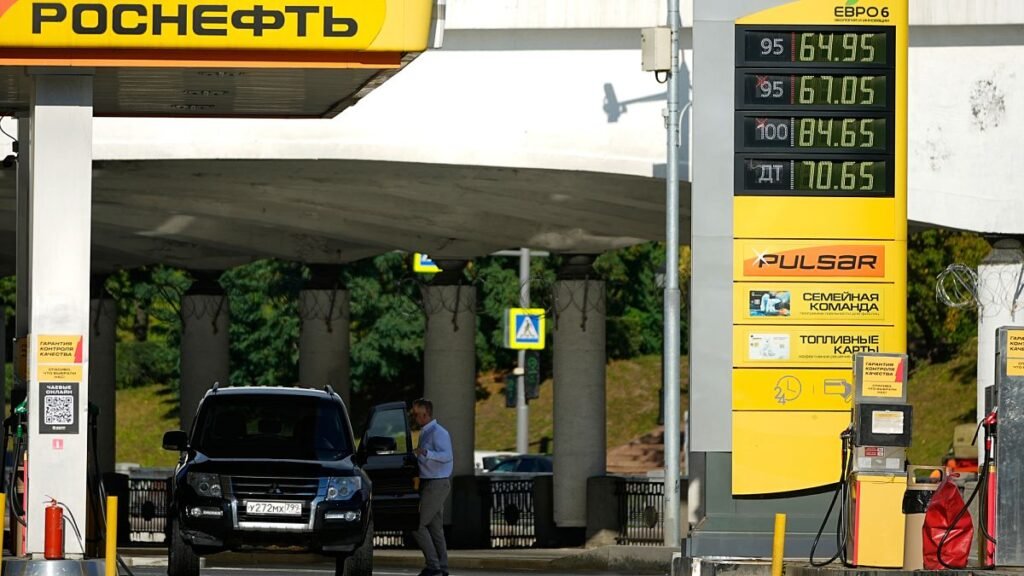Title: Ukraine Intensifies Attacks on Russian Oil Infrastructure: Impacts and Implications
Introduction
In a significant escalation of its military strategy, Ukraine has recently focused its efforts on targeting Russian oil infrastructure. This deliberate approach aims to undermine Russia’s war capabilities by disrupting its fuel supplies. On Thursday night, Ukraine struck a major oil refinery and petrochemical plant located in the Bashkortostan Republic, approximately 1,300 kilometers from the front line. Additionally, Ukrainian Special Operations Forces reported another strike on an oil refinery in the Volgograd region, which is crucial for supplying fuel to the Russian military.
H2: Strategic Importance of Attacking Oil Refineries
H3: Key Facilities Affected
The Volgograd refinery is not just any oil facility; it plays a pivotal role in Russia’s Southern Federal District by processing around 15.7 million metric tons of crude oil each year. This accounts for approximately 5.6% of Russia’s total oil refining capacity. This report from Reuters highlights that Ukrainian attacks have already shut down facilities responsible for 17% of Russia’s oil processing capacity, equating to about 1.1 million barrels per day.
H3: The Rationale Behind Targeting Oil Operations
The rationale behind this strategic move is evident. Oil and gas revenues are crucial to the Russian government, making up about one-third of its federal budget. Therefore, targeting oil infrastructure is a logical step for Ukraine, as emphasized by Ukrainian President Volodymyr Zelenskyy. He refers to these attacks as “the sanctions that work the fastest” in crippling Russia’s war efforts.
H2: The Consequences of Fuel Disruptions in Russia
H3: Economic Fallout
The impact of Ukraine’s strikes is palpable, leading to a noticeable decline in fuel availability across Russia. According to Russian economist Vladislav Inozemtsev, targeting oil refineries has a more far-reaching impact compared to strikes on other military assets like drone manufacturing facilities. Oil refineries are more complex and costly to repair, especially under heavy Western sanctions that make it difficult to source replacement parts.
Inozemtsev pointed out that while a drone manufacturing site can be quickly rebuilt, destroying an oil refinery can lead to prolonged operational shutdowns, affecting the economy significantly. A decrease in petrol production can lead to widespread shortages, with many consumers already experiencing long lines and rationing at gas stations. The worsening fuel situation is propelling prices to unprecedented levels, further burdening the Russian populace already facing economic stress.
H2: Can Russia Mitigate the Oil Shortage?
H3: Government Responses
In response to these disruptions, the Russian government has imposed a temporary ban on gasoline exports, scheduled to last until September 30, with further restrictions extending into October. This action reflects the urgency of the situation and the government’s attempts to stabilize the domestic fuel market.
According to Inozemtsev, there are ongoing discussions about developing missile defense systems and anti-drone defenses around critical infrastructure. However, these measures would divert vital resources away from other economic sectors.
H3: Financial Implications
The Russian government is increasingly reliant on oil and gas revenues, which have constituted a major part of its budget for the last decade. To navigate the current economic challenges, there are reports that Russia may consider increasing the value-added tax (VAT) to maintain fiscal balance.
H2: Assessing the Broader Impact of Ukrainian Strikes
H3: Public Sentiment and Economic Consequences
Despite the Russian economy’s resilience amid Western sanctions, the cumulative effects of Ukraine’s targeted strikes are beginning to reverberate throughout the country. GDP growth is projected to slow significantly, with estimates dropping from 4.3% to around 1%, and inflation rates hovering over 8%.
Inozemtsev notes that while the military’s capabilities may remain largely intact for now, the disruptions caused by Ukrainian attacks are leading to increasing public discontent. Problems such as fuel shortages, airport closures, and internet disruptions are acutely felt by the Russian population, causing a ripple of dissatisfaction among citizens.
Conclusion
Ukraine’s strategic attacks on Russian oil infrastructure represent a calculated effort to weaken Moscow’s war capabilities and economic stability. As these operations continue, the impact on Russia’s economy and public sentiment will likely escalate, raising questions about future military and political strategies. With the Ukrainian government focusing its efforts on disrupting oil supplies, the landscape of this ongoing conflict continues to evolve, emphasizing the critical role of energy resources in modern warfare.
For more comprehensive insights into the economic aspects of this conflict, visit Euronews and Reuters.


